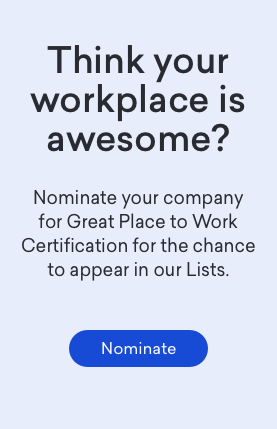In conjunction with the release of our Strategic HR Partnerships Best Practices Report, APQC is conducting a series of interviews with people who have experience with the topic of strategic HR partners. This third post in the series features China Gorman, CEO, Great Place to Work® Institute and author of the HR blog series chinagorman.com, sharing her views on the topic of strategic HR—why it matters and how HR can become more strategic.
APQC: Why does the strategic HR business partner topic matter?
China Gorman: I don’t really think of it in terms of partnership. I think of it as HR being part of the strategic business leadership of the enterprise. Partnership means it’s separate and another thing. My perspective is that strategic HR is the thing not a separate thing. I think that most CEOs and C-suite leaders are beginning to understand and believe that HR isn’t a separate thing but has to be part of the strategic leadership of any size organization.
At the same time, there is this growing perception of a skills gap. CEOs and other C-suite members are becoming very concerned about talent issues across the board. The Economist Intelligence Unit/Lloyds Risk Index surveys board members, CEOs, and other C-suite members from the largest global companies and asks them to rank 50 risks to their businesses’ success. Then, it asks each of them how prepared their organization is to mitigate those risks. The number one risk was loss of customers. The number two risk, of 50, was talent and skill shortages. That means that business leaders of the largest organizations around the world really are starting to see people and talent issues not as a separate thing but as a critical part of the strategic leadership of the enterprise.
I think that is why strategic HR really matters; it’s because it’s the foundation of any organization’s success whether the organization is large, small, for-profit, non-profit, a start-up, or a mature business. People and talent issues are the most important issues in organizational leadership today. So it’s just business leadership. It’s not a separate thing.
APQC: Why aren't all HR functions already operating as strategic business partners?
China Gorman: From my perspective the question is: Why aren’t all HR functions already operating strategically? It’s a historical artifact. HR really got started in the 1940s and 1950s. HR was about controlling and keeping track of time—about controlling tasks and administration. Then, HR very quickly moved, in the United States and then around the world, to a regulatory compliance function. It was called personnel administration. Administration was part of the title. HR was about administration and risk mitigation with a strong focus on regulatory compliance.
Fast forward to 2013, the compliance and regulatory environment is off the charts, not just in the United States but around the world. A day doesn’t go by in the United States when either at the municipal, state, or federal level there isn’t some new requirement for reporting or another kind of organizational behavior that gets you in trouble if you don’t do it. So, just at the time when HR really understands that it needs to be part of the strategic leadership of the organization, the compliance and regulatory piece keeps pulling it back down into administration. So, why isn’t HR acting more like a strategic leader of the business? It’s because the compliance piece is keeping it mired in administration and risk mitigation.
Truthfully, many organizations below the Fortune 200 haven’t had their HR budgets recover from the recession of 2008 and 2009. HR staff haven’t caught back up with where they were before the recession hit. There isn’t an HR person alive, I think, that doesn’t understand the need to be more strategic and to be a greater part of the business. But, the regulatory and compliance laundry list of stuff that has to be done keeps growing and HR doesn’t have the budget or the staff to do much more than the day-to-day tactical—get people paid on time, make sure we’re not overspending our benefits budget, understand what the requirements are for the new health care environment, understand the staffing requirements coming from the state house or Capitol Hill, etc.
It sounds like an easy excuse: “Well we can’t be strategic because we are so focused on the tactical.” But, I believe it. I am out with HR people all the time. And, I am not talking about Fortune 200 companies who have the budgets and whose HR leaders are really strategic business leaders and at the right hand of the CEO. That’s a whole different experience. I am talking about the millions of companies that have 2,000 or fewer employees.
APQC: What are 3 actions that an HR professional can take to be more strategic?
China Gorman: One is that they have to know their business. And, I don’t mean the business of HR. I mean the business of their business. From the ground up, they have to know: How do we make money? What are the costs? What’s the distribution? What’s R&D? How does technology play a part? What are the financial models? What about our competitors? They really have to know the business. The good news is that most HR people know their businesses. They know their businesses inside and out.
So, that leads to my second point which is they have to talk like a business person, not like an HR functional expert. I talk to HR people all the time and it is clear to me that they understand their business, but they talk like HR people. They don’t talk like business people.
And the third thing is to become solution oriented. In a lot of organizations, you hear that HR has the reputation of being the department of “No.” “No, you have to follow the policies.” So, if you become solutions oriented as opposed to policy enforcement oriented, and you speak the language of business as opposed to the language of HR, I think you’ll have a vastly different relationship and you will be seen in a vastly different light by your colleagues in other functions in the organization.
APQC: What are 3 actions that an HR leader can take to position his or her function to operate strategically?
China Gorman: First, have HR operate as a business strategy function, not a tactical compliance unit. This means have a different language and different operating structures, so that you become integral and not a separate thing. Second, create a reputation for providing talent-related business solutions, not roadblocks, to the desired business outcomes. So, that takes the risk mitigation piece away. Let the general counsel do that. Be a partner in providing solutions so that the others in the organization know that if I go to HR with an issue, they are going to help me speak about the answers as opposed to telling me what I can’t do. And then the third thing is to make sure that HR speaks the language of your business, not the language of HR. When you talk to marketing and you talk to sales and you talk to finance, they’re mostly talking the language of business. Inside their departments, they talk the language of their function. But once they are talking to the business, they talk the language of business. And I think HR could do a much better job of that.
ABOUT CHINA GORMAN
China Gorman is Chief Executive Officer of Great Place to Work®. With 30 years’ experience in strategic business leadership roles within HR professional services organizations, China has firmly established herself as a sought-after speaker, writer and thought leader within the human resources domain. Prior to joining Great Place to Work, China became well-known for her tenure as Chief Operating Officer and interim CEO of the Society for Human Resource Management (SHRM). Most recently she served as CEO for CMG Group and has also held the posts of President of DBM North America, and President of Lee Hecht Harrison, the global consulting division of Adecco, which became the performance leader in its industry under her leadership.
ABOUT APQC
APQC is a member-based nonprofit and one of the leading proponents of benchmarking and best practice business research. Working with more than 500 organizations worldwide in all industries, APQC focuses on providing organizations with the information they need to work smarter, faster, and with confidence. Every day we uncover the processes and practices that push organizations from good to great. Visit us at www.apqc.org and learn how you can make best practices your practices.














